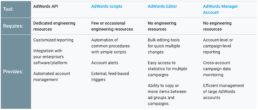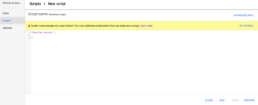Part 1: Automation
On May 8, ePPC took part in a Google automation and scripts workshop in Tallinn. The event was held at a cool startup community space called Lift99. Here, I’ll share some of the ideas that the Google guests encouraged to implement and also comment based on our agency’s experience with machine learning and AdWords scripts. Let’s start with automation.
The first speaker was Sebastian Kerth from Google’s Hamburg office. His talk centered on insights into using automated bidding strategies. He started by saying how Google’s strategy has lately moved on from mobile first to AI first. Talking about his experience with clients in Germany, he drafted ideas of how AdWords agencies’ work focus could change over the coming years – from campaign management to more time spent on strategy and more creative-conceptual work.
Thanks to machine learning, Google’s smart bidding has jumped in efficiency in the past 12 months. Clients are seeing that automation can really boost their performance. At ePPC, we’ve also seen that it has become more efficient recently (for some accounts), but there’s a few downsides and conditions, which I’ll go into later.
How AdWords smart bidding works
The main feature that machine learning can bring to the table is its ability to analyse more data and bid based on each single query. There are about 250 signals with more than 30 million combinations for each search that can be analysed for better performance. Smart bidding takes into account the past performance data for these different signals and finds the patterns that emerge. This way, it can better predict which searches are more likely to bring a conversion.
The data is analysed on a temporal basis, giving the most importance to the last 7 days and less to earlier data. This is useful but can also cause problems. For example, if your campaigns have been paused for more than a week or two, it’s better to start them off again with manual or enhanced CPC bidding. Continuing with target cost-per-acquisition (tCPA) or target return on ad spend (tROAS) can result in higher CPAs and lower performance after the break.

What is changing and how you can use it:
- Mobile and generic searches are increasing rapidly – automated strategies and data-driven attribution can help turn these searches into potential conversions.
- Google’s automated system for ad optimisation has grown smarter and they advise not to pause low-performing ads any more. The more ads, the better. Ads can vary in efficiency depending on the specific query. As the speaker said: „There is a specific ad for any specific user.“ And AdWords helps you find the optimal combination.
- When implementing smart bidding, the account can benefit from a different structure than the manual approach. For machine learning to have more data, a less granular structure is advised. The point is to feed as much info that we can into one campaign or ad group. This means having more ads in an ad group, having more keywords in a campaign, feeding audience list data to all campaigns, using ad customisers, and so on.
- Audience lists now automatically bid also based on recency and demographic data. You don’t have to make separate audiences based on these factors any more.
Problem points
When implementing smart bidding, it’s important to keep in mind that it’s not perfect for all accounts in all campaigns and all situations:
- The smart bidding strategy is still vulnerable to unexpected seasonality, and account changes, since it always has a learning period whenever a change is made.
- You might have too few conversions for the machine learning to even detect any patterns.
Solutions
- Adding micro-conversions which you think are vital to achieving the final sale can alleviate the lack of conversion data.
- Merging low-conversion campaigns into one campaign can also give you more data for the automation to do its thing.
- Use AdWords drafts & experiments to test which bidding strategies work best for your campaigns.
The opportunities that automation offers have to be used with care. Skillful analysis of the results is necessary when using any type of bidding strategies. Doubts remain but as the algorithms are getting smarter, we definitely suggest to try out smart bidding, even if it hasn’t worked for you in earlier times. It’s not perfect but it has great potential to get a competitive edge if you learn to make it work for your accounts.

Part 2: AdWords Scripts
Where to use scripts
The second speaker, also from Google’s Hamburg office, was Urs Enke. He gave an overview of how AdWords scripts can be used to improve the workflow. There are three big advantages: they can save us time, they can provide opportunities that would be too difficult to do manually and they can improve on the possibilities that the AdWords interface offers with more custom solutions.
The speaker brought out the most common uses for AdWords scripts:
- Changing target URLs
- Customized reporting – Export chosen data straight to Google Sheets, Slides or Docs.
- Account alerts – You can customize alerts so that you get the most important things to your email or even sent by SMS.
- Automated fixes/sanitisation – Resolve keywords conflicts, for example.
- Changes based on external data
The presentation included a table where you can check in which case it’s good to use scripts or other AdWords tools:

ePPC case study – weather bidding
Our agency uses scripts mainly for creating custom reports and alerts. For example, we use automatically updated budget sheets. There’re also other solutions, such as getting external data for automated bid adjustments. One favourite example that the presenter brought out was using weather data to change your campaigns. First, it requires a situation where you know that weather affects user behaviour. These kinds of insights are great to put into action and we have done it as well.

For advertising windshield repair shop, we used weather based bid modifiers in different cities, to raise the bids up to 30%. Our client knew that when it’s sunny, the windshield cracks become much more visible and people are more likely to come to repair them. And surely, the bid changes improved the account performance overall.
Limitations
Enke also brought out some of the limitations of scripts and how to overcome them. First, there is a time limit to how long the script can run (1h). This can be annoying if you wish to make changes in a lot of accounts with one script.
A workaround is to parallelise account processing, so that the script runs in different accounts simultaneously. The limit is 50 things in parallel. If there’s over 50 you need to get through, you can label the accounts and do it in different batches (1st script runs the 1st batch and another after that). This will get complicated if you have a large account with thousands of ads and keywords.
There’s also a limit for the over-eager script-maker, which is 250 scripts per user. But that isn’t a big problem, since the limit is pretty high.
An alternative to scripts is doing all of those things through the AdWords API but that’s already more complex and requires more programming skills.
Where to start
We got a quick introduction into how script-creation works, as well. Here’s how it looks in the AdWords interface:

All you need to start writing AdWords scripts are entry level JavaScript skills and an account. If you want to learn how to create custom scripts, there are plenty technical explanations out there. Google offers a starting point here: your first script. You can also get code snippets to work with as a resource, so you don’t have to build everything from scratch (examples).
There are also loads of pre-made scripts available on the web for copy-pasting into your accounts. But you should be careful with this, since the script has to be trustworthy. One way is to make sure that you understand what all the parts of the script actually do. But there are also lists of scripts that you can be sure are reliable (Google pre-made scripts list).
The funny thing is that you can even set up scripts that take external data and use it for reporting that has nothing to do with AdWords. There are so many options to play around with. So, why not try it out!
